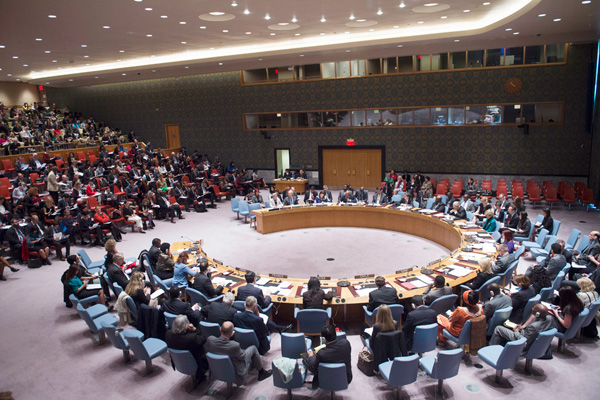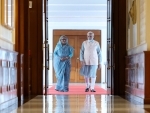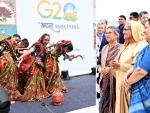World

UN reaffirms importance of women's empowerment for global peace, security
In a unanimously adopted Presidential Statement this morning ahead of a day-long debate on “women, peace and security,” the Security Council reaffirmed the need to dismantle the “persistent barriers” facing gender equality, calling on Member States to embrace a “dedicated commitment to women\'s empowerment, participation, and human rights” and ensure their full and equal participation in peace and security issues.
Held annually, the Council\'s open debate provides an opportunity for the wider UN membership to reflect on the progress made, and accelerate action on implementation of the Security Council resolution 1325, adopted in 2000, which requires parties in a conflict to respect women\'s rights and support their participation in peace negotiations and in post-conflict reconstruction.
In a message to the 15-member body delivered by Executive Director of UN Women, Phumzile Mlambo-Ngcuka, Secretary-General Ban Ki-moon thanked the Council for its “consistent focus” on women and peace and security issues, noting that such debate has enabled the international community “to move beyond viewing women as only victims of conflict to seeing them as agents of peace and progress.”
However, he expressed concern that “unprecedented levels of displacement” and the “immense human and financial cost of conflict” is testing global commitments to addressing the needs of women and girls around the world while also hindering their participation in conflict prevention, resolution and peacebuilding initiatives.
“The confluence of crises we face, rather than distracting from the imperative of gender equality, should drive us to do even more to live up to the principles enshrined in the United Nations Charter and global norms,” said Ban in his message.
“Squandering the potential dividends of gender equality for peace and development has never been more costly,” he added.
The Secretary-General urged Member States to “stand against abuses”, and voiced outrage at targeted attacks and human rights violations committed against women and girls, urging immediate action to end impunity in such cases and calling for “greater investments in measures to address this problem.”
Among these actions, he continued, was Security Council resolution 1325 which set out “a bold agenda for achieving gender equality as a prerequisite for peaceful and inclusive societies.”
“Led by UN Women, the United Nations is striving to realize this vision,” his message stated.
Following her delivery of the Secretary-General\'s message, Mlambo-Ngcuka, who also presented the UN chief\'s report on women and peace and security, addressed the Council on her own behalf and warned that the shifting trend in conflict – from Iraq, Nigeria and Syria to Somalia and Mali – is seeing a heightening of targeted violence against women, girls and their communities as extremists took control of territory.
“During and after conflict, more women die during childbirth, and more girls are forcibly married. Fewer women work and participate in the economy and [fewer] girls go to school. Of primary school age children that are out of school, half live in conflict areas. Only 35 per cent of girls are enrolled in secondary education in these settings,” she explained, adding that “this puts us all in danger.”
In highlighting the improvements made in the area of gender empowerment, Mlambo-Ngcuka cited the Secretary-General\'s findings, noting that over 80 countries had committed to the women, peace and security agenda; pointing out that the percentage of peace agreements committing to advancing the security and status of women and girls had more than doubled since 2011; and indicating the “unprecedented” six women ambassadors sitting on the Security Council as evidence of “remarkable” gains.
But, she cautioned, much still remained to be done – not least because



